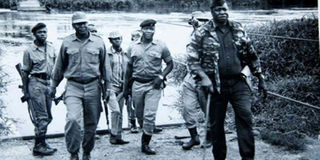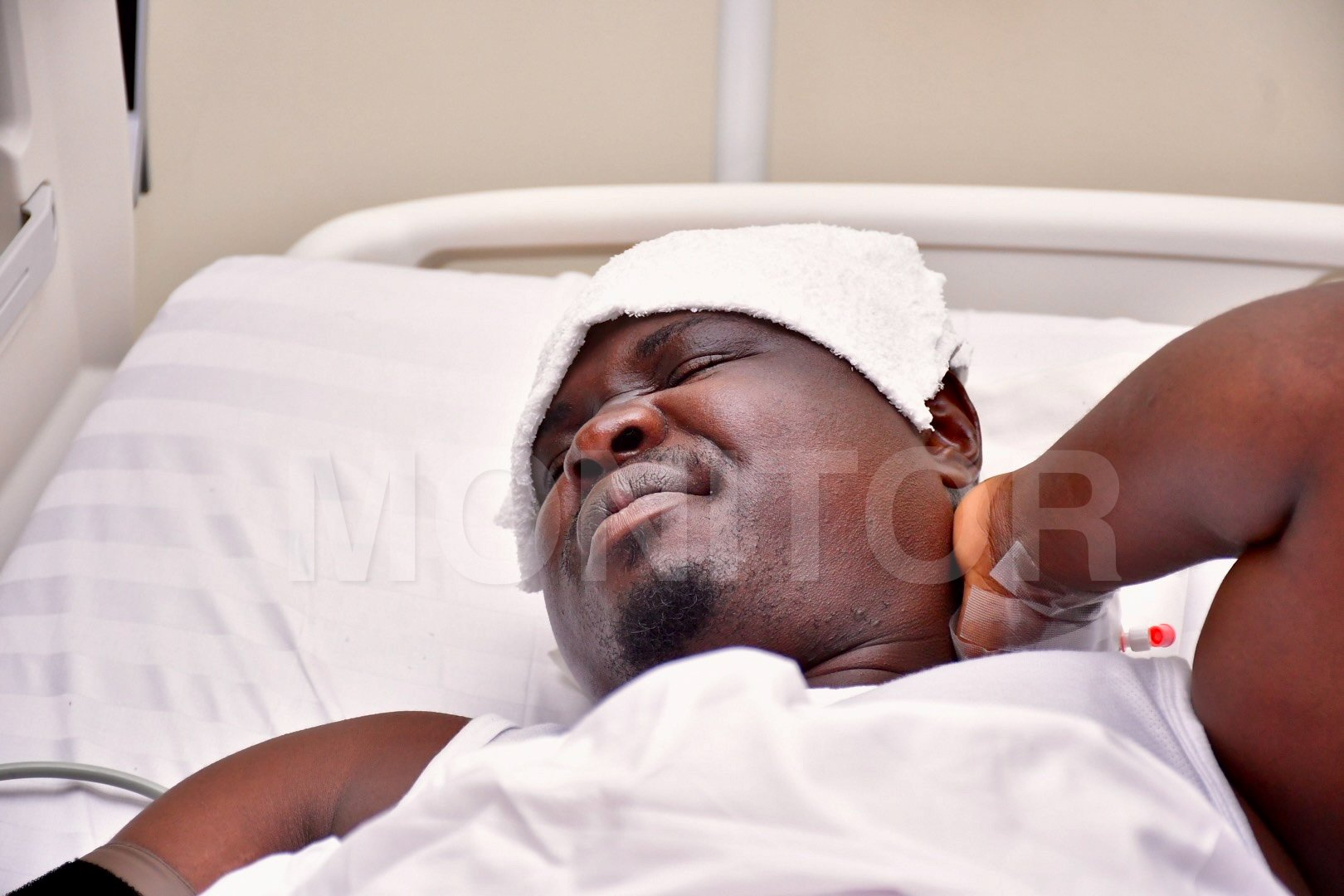Prime
How Obura killed Dungu in Amin era

Amin (R) at the Kagera Salient before he was overthrown.
What you need to know:
Amin’s close ally Obura finds himself caught by the law long after their regime had collapsed and is hanged in 1989.
During Idi Amin’s reign, many people especially Ugandans are reported to have been murdered.
In spite of the innumerable mysterious deaths by extra judicial killings, some victims were lucky to have witnesses who reported such deaths and later informed their relatives to retrieve the corpses for burial or to know who killed their loved ones, when, how and where.
Perpetrators of such heinous crimes such as the former deputy head of the notorious Public Safety Unit (PSU) Kassim Moses Obura were after the fall of the regime in 1979, caught up in the cob-web of justice and could not survive the hangman’s noose.
Obura had, according to reports, brutally killed a famous Kampala businessman.
Obura appears in court
Shortly after he was arrested on October 13, 1980, Obura appeared in the Kampala High Court presided over by Justice Benjamin Odoki to answer a murder charge levelled against him.
Obura was accused of murdering Samson Dungu a Kampala businessman. His former immediate boss at PSU and co-accused Ali Toweli at the time of death was still at large when Obura came face-to-face with justice in the courts of law.
Throughout the court proceedings, Obura faced a total of 21 witnesses, who pinned him on the murder charge before he was sentenced to death.
Prosecution
On October 29, 1980, Obura faced state witness Enos Sebunya, 38, who testified against him. Sebunya is now a practising lawyer based in Toronto, Canada. He told court that on November 23, 1973, Obura, using his pistol shot in the back and killed the hand-cuffed Dungu.
Before shooting Dungu, he told him to face the wall, Sebunya told court.
Dungu was a co-owner of the famous Delite Cinema in Kampala, the court heard. And after Dungu, Obura ordered Sebunya and two other prisoners to load Dungu’s dead body onto the police Land Rover, Sebunya testified before court.
The state witness had earlier told court how he and Dungu were arrested from Buganda Road Magistrate’s Court and YMCA premises respectively by the PSU men after a shooting incident.
While Dungu was bundled into the boot of a white Mercedes-Benz, Sebunya was forced into a Land Rover and taken to Naguru PSU headquarters, where Ali Toweli ordered Sebunya to remove his shoes, jacket and tie and reportedly started beating him.
Sebunya further told court that shortly before Dungu was killed, he heard him cry out for mercy as he screamed: “Obura do not do it. Let someone else do it. You are my brother-in-law”. Court records reveal.
Another witness Lameck Muwanga, 37, a brother of the deceased, told court that upon his brother’s arrest, he raised Shs54,000 and gave it to Obura to release Dungu.
Although Obura had asked for Shs55,000, he accepted the given money and released Dungu; but one week later he was rearrested and charged with stealing Shs54,000 from Delite Cinema. Muwanga an accountant with the Delite Cinema told court.
Obura’s lawyer Protazeo Ayigihugu on November 14, 1980, admitted before court that his client released Mubiru and Senkuba after receiving Shs54,000, but added that it was to settle the matter with Lt Brown Ondongo who had arrested Dungu and others – and that when Dungu was re-arrested, Obura advised the deceased to get a lawyer.
Dungu’s co-accused A. Mubiru and M. Senkuba both employees of Delite Cinema and Topista Namusisi, a Grindlays Bank cashier, were also crossed-examined by the defence counsel in connection with the same forged cheque and other documents at Delite cinema.
Other former prisoners at the PSU who testified against Obura were Fred Kabuuka who said he saw Obura shooting Dungu dead, Makumbi, and Dungu’s father who told court that Obura had threatened to kill his son if he did not plead guilty to the charge put against him by the PSU.
Obura sentenced to hang
On January 22, 1981, Obura was sentenced to hang by the then Kampala High Court Judge, Justice Benjamin Odoki.
While delivering judgment, Justice Odoki told Obura that he was satisfied with the prosecution witnesses and assessors that he had maliciously and unlawfully killed Dungu.
Before Odoki sentenced Obura, he asked him if he had anything to say.
Speaking in English Obura said: “My Lord, as from the beginning, you have heard all the evidence. I have nothing to say but I still maintain my innocence.”
Inspite of lack of a post-mortem report, Justice Odoki admitted that he was satisfied with the evidence provided to court by Dr Kakande and Ms Norah Mwanje who both saw Dungu’s corpse at the mortuary with bullet wounds in the chest. Obura through his lawyer Protazio Ayigihugu filed an appeal against the judgment but was quashed by the Court of Appeal.
Obura hanged
On March 15, 1989, at Luzira Maximum Security Prison in Kampala, the infamous hangman placed the noose onto the 60-year-old Obura’s neck.
On that day, Obura and two others including a soldier, became the first Ugandans to be hanged under the NRM government since 1986 when they captured power from the Tito Okello Lutwa military government.
Mr Henry Kyemba, who served as the minister for Health in the early years of Idi Amin’s government before he escaped to exile, said of Obura when asked about the kind of a person he was.
“Obura was very notorious. But Amin promoted him to be the Commissioner of the Uganda police”.
AMIN'S EIGHT YEARS
1971 - Amin discovers that Obote intends to arrest him on charges of misappropriating millions of dollars of military funds. On 25 January, while Obote is out of the country attending the Commonwealth Conference in Singapore, Amin stages a coup that is later reported to have been backed by Israel and welcomed by the British.
1972 - Now determined to make Uganda “a black man’s country”, Amin expels the country’s 40,000-80,000 Indians and Pakistanis in the closing months of the year, reportedly after receiving a message from God during a dream.
As terror reigns Uganda’s economy begins to collapse, partially through mismanagement and partially as a result of the expulsion of the Indians and Pakistanis.
1975 - Amin promotes himself to field marshal and awards himself the Victoria Cross. The following year he declares himself president for life.
1976 - Amin becomes personally involved in hostage negotiations with Israel when pro-Palestinian guerrillas hijack an Air France passenger jet carrying 105 Israelis and Jews on June 27 and order it fly to Entebbe in Uganda. However, he is deeply humiliated when Israeli commandos stage a successful raid and rescue the passengers on July 4.
1977 - In January Amin accuses the Anglican archbishop of Uganda of conspiring in an invasion plot. The next day the archbishop and two Cabinet ministers are murdered.
The US cuts aid to Uganda, with President Jimmy Carter saying Amin’s policies “disgusted the entire civilised world.”
1978 - The price of coffee, Uganda’s main export, begins to fall, further damaging the already staggering Ugandan economy. Armed rebellions break out in the southwest, coup attempts become an ever-present threat, and the Libyans begin to cut aid.
Amin launches an attack on Tanzania, a neighbouring country to the south, at the end of October.
1979 - Beating back the Ugandan’s heavy resistance, the invading Tanzanian forces take Kampala on 11 April. Amin flees to Libya, taking his four wives, several of his children.




